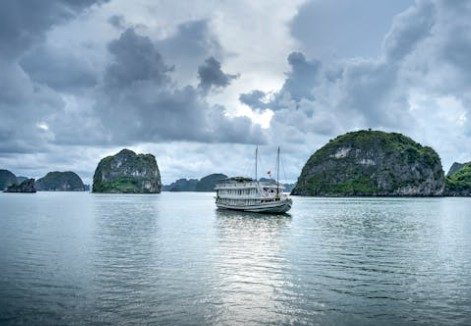
The Revolution of Small Ship Cruising
Small ship cruising represents a fundamental shift from quantity to quality in travel experiences. While massive cruise ships may accommodate thousands of passengers, small ship cruising typically limits capacity to under 200 guests—and in the case of the Canadian Empress, just 66 passengers. This deliberate constraint creates opportunities for authentic experiences, personalized service, and meaningful connections that are impossible on larger vessels.
“Small ship cruising allows us to focus on what truly matters,” explains a representative from St. Lawrence Cruise Lines. “Instead of competing with entertainment complexes at sea, we offer something far more valuable—genuine connections with destinations, fellow travelers, and the natural world around us.”
The philosophy behind small ship cruising extends beyond passenger count. These vessels are designed to access waterways and ports that mega-ships cannot reach, opening up remote destinations and hidden gems that remain untouched by mass tourism. The Canadian Empress exemplifies this approach, navigating the historic St. Lawrence and Ottawa Rivers with ease while larger ships remain confined to major ports.
Personalized Service: The Heart of Small Ship Cruising
Perhaps the most immediate advantage of small ship cruising is the level of personalized attention each passenger receives. With crew-to-guest ratios often approaching 1:2 or better, staff members quickly learn passengers’ names, preferences, and needs, creating an atmosphere more reminiscent of a private yacht than a commercial cruise ship.
Aboard the Canadian Empress, this personalized approach manifests in countless ways. Crew members remember your coffee preference, dining staff know your favorite table, and expedition leaders tailor shore excursions to match passenger interests. This attention to detail transforms what could be an anonymous vacation into a deeply personal journey.
“In small ship cruising, every passenger matters,” notes a crew member. “We’re not managing crowds—we’re caring for individuals, each with their own interests and preferences.”
Access to Authentic Experiences
The smaller scale of vessels like the Canadian Empress opens doors to authentic experiences unavailable to larger ships. Small ship cruising allows for flexible itineraries that can be adjusted based on weather, wildlife sightings, or unique local opportunities. Passengers might find themselves invited to a local festival, enjoying an impromptu wildlife viewing session, or exploring a charming riverside community that appears on no standard cruise itinerary.
Shore excursions in small ship cruising are conducted in intimate groups, often with fewer than 20 participants. This allows for meaningful interactions with local guides, unhurried exploration of historical sites, and the flexibility to spend more time at locations that particularly captivate the group.
The Canadian Empress’s small ship cruising itineraries include visits to historic sites like Fort Henry in Kingston, the engineering marvels of the canal systems, and the cultural treasures of Quebec City—all explored at a pace that allows for genuine appreciation rather than hurried photography.
Environmental Responsibility in Small Ship Cruising
Small ship cruising inherently operates with a lighter environmental footprint than its large-scale counterparts. Smaller vessels consume less fuel, generate less waste, and have minimal impact on the marine ecosystems they visit. This environmental consciousness aligns with the growing desire among travelers to explore the world responsibly.
The Canadian Empress demonstrates this commitment through careful navigation practices that protect sensitive riverine ecosystems and support for local communities through partnerships with regional guides, suppliers, and cultural institutions.
The Social Advantages of Small Ship Cruising
One of the most cherished aspects of small ship cruising is the sense of community it fosters among passengers. Shared dining tables, comfortable lounge spaces, and intimate ship size naturally encourage conversation and connection. Many passengers report that friendships formed during small ship cruising adventures continue long after the voyage ends.
The demographic attracted to small ship cruising tends to be curious, well-traveled individuals who value substance over spectacle. Conversations flow easily from discussions of history and culture to shared travel experiences and future adventures. This intellectual stimulation adds depth to the journey that entertainment-focused cruises often lack.
Culinary Excellence in Small Ship Cruising
Without the need to feed thousands of passengers, small ship cruising can focus on culinary quality over quantity. Meals aboard the Canadian Empress feature fresh, local ingredients prepared by skilled chefs who can accommodate individual dietary needs and preferences.
The single-seating dining approach common in small ship cruising encourages lingering conversations over meals, transforming dining from mere sustenance into social and cultural experiences. Regional specialties and local wines introduce passengers to authentic flavors of the destinations visited.
The Future of Small Ship Cruising
As travelers increasingly seek authentic, meaningful experiences, small ship cruising continues to grow in popularity. Post-pandemic travel preferences have further accelerated this trend, with many voyagers preferring the safety and intimacy of smaller vessels over crowded mega-ships.
St. Lawrence Cruise Lines represents the best of this evolving travel segment, combining the intimacy and personalization that define small ship cruising with the rich history and natural beauty of Canada’s historic waterways. Their commitment to authentic experiences, environmental responsibility, and genuine hospitality exemplifies why small ship cruising is not just a trend but a fundamental reimagining of how we explore the world.
For travelers ready to discover the advantages of small ship cruising, the M/V Canadian Empress offers an ideal introduction to this transformative travel style, where every voyage becomes a journey of personal discovery and meaningful connection.